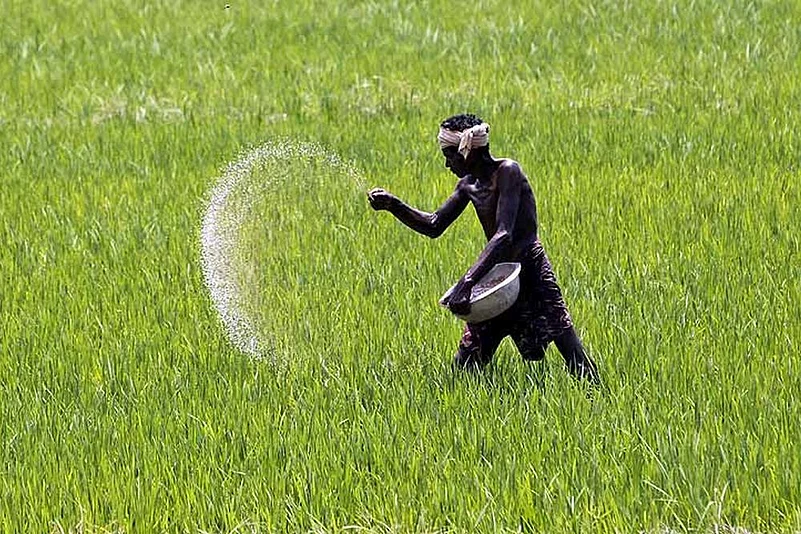The government today hiked the minimum support price for paddy by a record Rs 200 per quintal that will cost the exchequer over Rs 15,000 crore and help fulfil its poll promise to give farmers 50 per cent more rate than their cost of production.
The decision, taken by the Cabinet Committee on Economic Affairs (CCEA) headed by Prime Minister Narendra Modi, comes less than a year before next general elections.
The previous highest hike in paddy MSP was Rs 170 a quintal in the 2012-13 crop year. In the last four years, the NDA government has raised the paddy MSP between Rs 50-80 per quintal.
Advertisement
While the BJP had promised in 2014 to give farmers a price of 1.5 times of cost, an announcement to give effect to the promise was made in the government's fifth and final annual Budget presented on February 1 this year.
Briefing about the CCEA decision, Home Minister Rajnath Singh said the Cabinet has approved the MSP of 14 kharif (summer-sown) crops for the 2018-19 season.
The government's price advisory body Commission for Agricultural Costs and Prices (CACP) has calculated production cost of paddy at Rs 1,166 per quintal and the government has raised the MSP of paddy (common grade) by Rs 200 to Rs 1,750 per quintal for 2018-19 season, he said.
Advertisement
The support price of Grade A variety of paddy has been raised by Rs 180 per quintal to Rs 1,770. The increase in paddy MSP is 50-51 per cent over its production cost.
"This will send a positive message to farmers and boost their confidence and end farm distress," Singh said.
Terming it as a historic decision, the minister said the sharp increase in MSP was done after a lot of consideration and "not in hurry". The hike in MSP will cost the exchequer over Rs 15,000 crore, he added.
"This will increase the income of farmers and purchasing capacity, which will have impact on wider economic activity".
Replying to queries on likely impact of MSP hike on price rise, Singh said, "We are concerned about inflation. It is not correct to say that inflation will go up. We have controlled inflation in last four years and will succeed in controlling it in future as well as".
According to the government, the MSP of cotton (medium staple) has been raised to Rs 5,150 from Rs 4,020 and that of cotton (long staple) to Rs 5,450 from 4,320 per quintal.
The CACP has pegged the production cost of medium staple cotton at Rs 3,433 per quintal and the MSP increase is 50 per cent over the cost.
Advertisement
In pulses, tur MSP has been raised to Rs 5,675 per quintal from Rs 5,450 and that of moong to Rs 6,975 per quintal from Rs 5,575. Urad MSP has been hiked to Rs 5,600 from Rs 5,400 per quintal.
The MSP of tur and urad has been raised by up to 66 per cent over their production cost.
Among coarse cereals, the MSP of ragi has raised by Rs 997 per quintal to Rs 2,897, while that of bajra by Rs 525 per quintal to Rs 1,950 and maize by Rs 275 per quintal to Rs 1,700 for the current year.
Advertisement
The MSP of jowar (hybrid) has been raised by Rs 730 per quintal to Rs 2,340 for this year, while that of Maldani variety by Rs 725 per quintal to Rs 2,450, the government said.
Among oilseeds, MSP of soyabean has been increased to Rs 3,399 per quintal from Rs 3,050, while that of groundnut (shell) to Rs 4,890 per quintal from Rs 4,450, sunflower seed to Rs 5,388 per quintal from Rs 4,100, Sesamum to Rs 6,249 per quintal from 5,300 and niger seed to Rs 5,877 per quintal from Rs 4,050.
There has been 50 per cent increase in the MSP of oilseeds over the cost of production.
Advertisement
Asserting that farmers are biggest producers and consumers, Singh said, "After the country's independence, farmers have not got right price for their produce. Farmers were in despair and their plight was understood by the Prime Minister".
Welcoming the decision, Food Minister Ram Vilas Paswan said, "We will ensure that each grain is bought at MSP. We have fulfilled the promise. The decision is not linked to next year general elections".
He also said that people raise concerns when food prices are raised, who otherwise remain unperturbed when the rates of other consumer goods go up.
The Food Corporation of India (FCI), the government's nodal agency for procurement and distribution of foodgrains, buys wheat and rice from farmers at MSP and supply the grains under the food security law.
Advertisement
Paddy is the main kharif (summer sown) crop, the sowing of which has already begun with the onset of southwest monsoon.
India is estimated to have harvested a record foodgrains production at 279.51 million tonnes in the 2017-18 crop year (July-June) on all-time high output of rice, wheat, coarse cereals and pulses.
The announcement of higher MSP coupled with forecast of normal monsoon this year could further boost foodgrains output. However, the higher support price could also fuel food inflation.
(PTI)




















